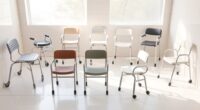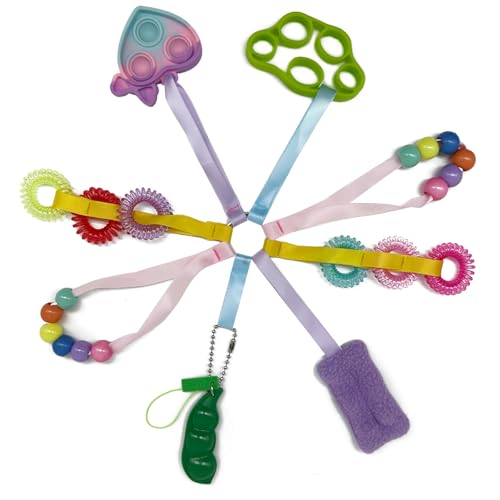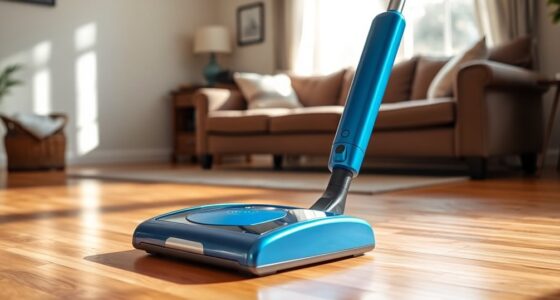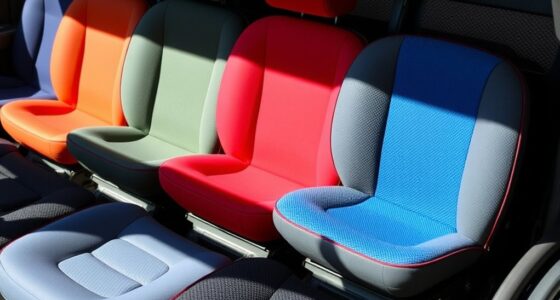If you’re looking for the best fidget toys for Alzheimer’s patients, I recommend options like sensory rings, textured lap pads, silicone puzzles, and wrist cuffs with buttons or beads. These toys can help reduce anxiety, improve focus, and provide calming sensory stimulation. They’re safe, portable, and easy to use in various settings. Keep in mind safety and individual preferences—stick to high-quality, non-toxic designs. If you’re curious, you’ll discover more about the top choices and their benefits here.
Key Takeaways
- Sensory fidget toys like textured rings, beads, and tactile blankets promote relaxation and reduce anxiety in Alzheimer’s patients.
- Portable, lightweight options such as wrist cuffs and worry stones are ideal for on-the-go calming.
- Durable, non-toxic materials ensure safety and longevity for continuous use and easy cleaning.
- Multi-sensory features including visual, tactile, and auditory elements enhance focus and cognitive engagement.
- Supervised, appropriately sized toys help prevent choking hazards and accommodate various cognitive and physical needs.
Sensory Toys for Alzheimer Patients for Therapy and Anxiety Relief
Fidget toys, especially sensory wrist cuffs, are an excellent choice for Alzheimer’s patients who need calming tools that are easy to use and portable. These cuffs serve as therapeutic aids, helping to reduce anxiety, agitation, and restlessness. They keep hands busy with engaging features like buttons, sequins, ribbons, and beads, which stimulate nerve receptors on fingertips. This stimulation promotes finger, hand, joint, and brain activity, offering both calming and cognitive benefits. Their lightweight, wearable design makes them convenient for daily use, providing comfort and mental engagement wherever patients go. Overall, sensory cuffs are effective, simple tools that support therapy and emotional well-being.
Best For: individuals with Alzheimer’s, dementia, autism, ADHD, or OCD seeking calming, engaging, and portable sensory tools to reduce anxiety and promote mental well-being.
Pros:
- Easy to wear and portable, making it suitable for daily use and on-the-go therapy
- Stimulates nerve receptors on fingertips, aiding cognitive and sensory development
- Made with durable materials and accessories to ensure safety and long-lasting engagement
Cons:
- May require supervision for individuals prone to pulling or twisting to prevent damage
- Some users might find certain accessories overstimulating or distracting
- Limited to wrist size, which may not fit all users comfortably
Sensory Toys for Alzheimer Patients Anxiety Relief
Sensory toys designed for Alzheimer’s patients are an excellent choice for those experiencing anxiety or restlessness. These toys help promote relaxation, reduce nervousness, and distract restless hands. For example, fidget rings provide tactile stimulation by engaging nerve receptors on fingertips, encouraging finger, hand, and brain activity. They’re lightweight, portable, and easy to wear, making them perfect for on-the-go calming. With features like marble mazes, beads, elastic rings, and vibrant colors, these toys keep users engaged while soothing anxiety. They’re simple to use and suitable for seniors with cognitive or sensory challenges, offering a thoughtful way to promote calmness and positive social behavior.
Best For: individuals with Alzheimer’s, dementia, autism, ADHD, or sensory challenges seeking calming and engaging sensory stimulation.
Pros:
- Provides tactile and visual stimulation to help reduce anxiety and nervousness.
- Lightweight, portable, and easy to wear, making it convenient for on-the-go use.
- Includes diverse features like marble mazes and elastic rings that promote relaxation and positive social behavior.
Cons:
- Not suitable for children under 14 years old.
- May require supervision for individuals with severe cognitive impairments.
- Limited color and feature options might not appeal to all users.
Fidget Blanket for Adults with Dementia
For caregivers seeking a calming, engaging activity for adults with dementia, the fidget blanket offers an effective solution. This sensory tool features 13 tactile items designed to reduce anxiety and promote relaxation. Measuring around 22 x 28 cm folded and 45 x 28 cm unfolded, it’s portable and easy to handle. The blanket keeps hands busy with various textured activities, helping improve fine motor skills and sensory development. It’s especially useful in care settings or during travel, providing a safe way to soothe nervousness and agitation. Whether for seniors or children with sensory needs, the fidget blanket offers versatile, calming engagement tailored to individual comfort.
Best For: caregivers and family members seeking a calming, sensory activity to help adults with dementia, Alzheimer’s, autism, or related conditions remain engaged and relaxed.
Pros:
- Includes 13 tactile sensory items that promote calmness and sensory stimulation.
- Portable design with handles, making it easy to carry and store.
- Helps improve fine motor skills and reduce anxiety in various settings.
Cons:
- May require regular cleaning to maintain hygiene, especially with frequent use.
- Some users might find certain textures less appealing or overwhelming.
- The size may be less suitable for individuals with limited hand mobility or smaller hands.
Sensory Toys for Alzheimer Patients, Therapy & Anxiety Relief, Arm Pillow Fidget Wrist Cuff (Red+Grey)
When caring for loved ones with Alzheimer’s, finding safe and effective ways to reduce anxiety and restlessness is essential. Sensory toys like the Arm Pillow Fidget Wrist Cuff provide calming tactile stimulation by engaging nerve receptors on fingers and hands. Designed as lightweight arm pillows or cuffs, they’re easy to wear and perfect for everyday use. With colorful accessories like buttons, sequins, ribbons, and beads, they keep hands occupied while promoting nerve activity and social interaction. Made with durable sewings, these toys are safe and resistant to pulling. They’re simple to use and portable, offering immediate relief and comfort whenever needed.
Best For: individuals with Alzheimer’s, dementia, autism, or other cognitive and motor challenges seeking calming, sensory stimulation and anxiety relief through portable, safe, and engaging tactile tools.
Pros:
- Effectively reduces anxiety, restlessness, and loneliness with calming tactile stimulation
- Durable construction with sewn accessories ensures safety and resistance to pulling or twisting
- Lightweight and portable design makes it easy to use on-the-go for immediate comfort
Cons:
- May require supervision for individuals with severe cognitive impairments to prevent misplacement of accessories
- Limited color options or accessory styles might not suit all personal preferences
- Some users might need time to become accustomed to the tactile sensations for maximum benefit
Sensory Toys for Alzheimer Patients Anxiety Relief Dementia Ring
If you’re seeking a simple, effective way to help seniors with Alzheimer’s or dementia stay calm and engaged, the Dementia Ring offers an excellent solution. This lightweight, wearable sensory toy features marble mazes, press toys, beads, and elastic rings that stimulate nerve receptors on fingertips. It promotes relaxation, reduces anxiety, and encourages positive social behavior. Designed for daily use, the ring fits comfortably on fingers and is portable. By engaging hands and minds, it helps restless hands stay occupied and supports mental well-being. Suitable for users aged 10 months and up, this ring is a thoughtful tool to improve calmness.
Best For: seniors with Alzheimer’s or dementia seeking a portable, calming sensory tool to reduce anxiety and promote engagement.
Pros:
- Lightweight and easy to wear on fingers for convenience.
- Stimulates nerve receptors on fingertips to promote relaxation and mental activity.
- Suitable for various conditions including autism, ADHD, and anxiety, making it versatile.
Cons:
- Customer ratings are average, with some users citing limited durability.
- Limited color and design options may not appeal to all users.
- Small parts or beads could pose a choking hazard for very young children if not used carefully.
Fidget Toys Adults Sensory Stone: 6 Pack Textured Worry Stones
The Fidget Toys Adults Sensory Stone: 6 Pack Textured Worry Stones are ideal for individuals seeking discreet, calming sensory tools. These textured worry stones help reduce anxiety, promote focus, and replace nervous habits through tactile engagement. Their quiet, non-noise design allows for silent use in any setting—office, classroom, or public. Small and portable, they easily fit in pockets or bags, making stress relief accessible anywhere. Crafted from durable, washable material with smooth edges, they’re safe for children and adults alike. Whether as a gift or personal tool, these stones offer a simple, effective way to calm nerves and improve concentration.
Best For: individuals of all ages seeking discreet, calming sensory tools to reduce anxiety, improve focus, and manage nervous habits in various settings.
Pros:
- Quiet, non-noise design allows for silent use in public or shared spaces
- Durable, washable material with smooth, rounded edges ensures safety and longevity
- Small, portable size makes it easy to carry and use anywhere
Cons:
- Limited tactile variety may not satisfy users seeking more diverse textures
- May require repeated use over time for noticeable calming effects
- Some users might prefer larger or more complex sensory tools for deeper engagement
Sensory Toys for Alzheimer’s Patients, Fidget Blanket for Adults with Dementia
Sensory toys like fidget blankets are especially suitable for seniors with Alzheimer’s or dementia who need gentle, tactile engagement to reduce anxiety and agitation. These blankets feature multiple sensory elements that promote relaxation and improve focus through touch. They’re lightweight, portable, and easy to use, transforming from a wearable wrist cuff into a fidget mat. Simply buckle or unbuckle to switch modes, making them convenient for home or on-the-go use. Designed specifically for elderly individuals, these sensory toys serve as calming, engaging tools that help keep hands busy, support mental well-being, and provide safe, soothing activities for those with dementia.
Best For: seniors with Alzheimer’s or dementia seeking calming, tactile engagement to reduce anxiety and improve focus.
Pros:
- Provides soothing tactile stimulation that helps alleviate anxiety and agitation
- Easy to switch between wrist cuff and fidget mat modes for versatile use
- Portable and lightweight, ideal for home or on-the-go activities
Cons:
- May require guidance for proper use by individuals with severe cognitive impairments
- Some users might find the sensory elements overwhelming or overstimulating
- Durability of sensory components could vary with frequent use
SOFWO Fidget Blanket and Muff for Adults with Dementia
For adults with dementia or Alzheimer’s, the SOFWO Fidget Blanket and Muff offers a practical way to soothe restless hands and promote calmness. This sensory tool features a detachable fidget blanket that encourages tactile engagement, stimulating fingertips, fingers, and joints to help reduce agitation. Designed with soft, durable, hand-sewn accessories, it guarantees safety and longevity. Ideal for use in care facilities or at home, it supports emotional well-being by providing calming sensory activities. Easy to share and store, it’s a versatile addition to any care routine, helping seniors stay relaxed and focused while offering comfort and mental stimulation.
Best For: seniors and adults with dementia, Alzheimer’s, autism, Asperger’s, ADHD, or anxiety seeking sensory stimulation and calming support in care or home settings.
Pros:
- Provides effective sensory engagement to help reduce agitation and promote relaxation
- Durable, soft, and hand-sewn accessories ensure safety and long-lasting use
- Easy to share, store, and incorporate into daily care routines
Cons:
- Hand wash recommended, which may require extra effort for cleaning
- Accessories are sewn securely but may still pose a slight risk if heavily tugged
- Not suitable for individuals with allergies to certain fabrics or materials
Dementia Activities for Seniors (2nd Generation)
These second-generation dementia activities are perfect for seniors who need engaging, easy-to-manage mental exercises. They feature wooden puzzles, games, and gifts designed with vibrant colors and large, easy-to-grip blocks, making them suitable for all adults. With 30 difficulty levels, these activities keep seniors mentally stimulated and help improve cognitive function over time. Completing puzzles offers a sense of achievement, boosting confidence and mood. They’re discreet, with no dementia labels on the packaging, making them ideal gifts for loved ones, whether at home or in care facilities. These tools promote patience, fine motor skills, and ongoing mental activity in a simple, enjoyable way.
Best For: seniors with dementia or cognitive decline seeking engaging, easy-to-manage mental activities to enhance cognitive function and mood.
Pros:
- Features vibrant colors and large, easy-to-grip blocks suitable for all adults.
- Offers 30 difficulty levels for prolonged mental stimulation and varied challenge.
- Discreet packaging with no dementia labels, making it an ideal gift option.
Cons:
- May require supervision for proper puzzle completion, especially for those with advanced dementia.
- Limited to basic shapes and colors, which might not challenge more advanced users.
- Some users may find the puzzle assembly less engaging over time after repeated use.
Sensory Fidget Toys for Alzheimer’s and Dementia
If you’re seeking a calming activity for seniors with Alzheimer’s or dementia, sensory fidget toys are an excellent choice. These toys provide engaging sensory experiences that help reduce anxiety and nervousness. They stimulate nerve receptors on fingertips, keeping fingers, hands, joints, and the brain active. Features like marble mazes, resistance rings, squeeze peas, and elastic rings make them versatile and engaging. Made from calming materials and colors, they promote relaxation. Portable and lightweight, many can be worn on fingers for convenience. Suitable for daily use, these toys are thoughtful gifts that encourage calmness, focus, and social interaction for individuals with cognitive or developmental conditions.
Best For: seniors with Alzheimer’s, dementia, autism, Asperger’s, ADHD, or anxiety seeking calming, sensory engagement to reduce nervousness and promote relaxation.
Pros:
- Provides a variety of sensory activities to keep fingers, hands, and brain engaged
- Made from calming materials and colors to promote relaxation and reduce anxiety
- Portable, lightweight, and wearable on fingers for easy daily use and convenience
Cons:
- May be less engaging for individuals without sensory processing needs
- Limited information on durability over extended use or washing
- Some users might find small components like beads or mazes challenging to handle or keep track of
Sensory Toys for Alzheimer Patients and Seniors
Sensory toys like fidget wrist cuffs and arm pillows are ideal for seniors and Alzheimer’s patients who need gentle, calming stimulation. These products offer comfort, reduce boredom and anxiety, and help maintain motor skills through varied textures and visual elements. Made from soft, durable fabrics, they feature shapes, ribbons, beads, and tassels that engage senses safely. Their portability makes them convenient for use at home or on the go, providing a soothing distraction. Perfect as thoughtful gifts, these sensory toys support mental well-being and physical activity, making them valuable tools for caregivers and families aiming to enhance quality of life for seniors and those with dementia.
Best For: seniors, Alzheimer’s patients, and individuals with autism, ADHD, or anxiety seeking calming, sensory engagement and motor skill support.
Pros:
- Provides calming comfort and reduces anxiety through varied textures and visual elements
- Portable and easy to carry, suitable for use at home or on the go
- Made from soft, durable fabrics with secure sewing for safety and longevity
Cons:
- May require supervision for individuals with severe cognitive or motor impairments
- Some users might find certain textures or shapes less engaging over time
- Not a substitute for professional medical or therapeutic treatment
Fidget Blanket and Muff Dog for Dementia Patients
The Fidget Blanket and Muff Dog are excellent choices for dementia patients who need gentle, tactile stimulation to stay calm and focused. These products are designed for seniors with memory loss, Alzheimer’s, or sensory needs, offering soothing sensory engagement. The detachable fidget blanket keeps restless hands occupied, reducing anxiety, while the soft Muff Dog provides comfort and a sense of security. Made with durable, hand-sewn accessories, they’re suitable for use in care homes or at home. Easy to clean and share, they promote mental and sensory activity, supporting overall well-being and helping to alleviate symptoms across different stages of dementia.
Best For: individuals with dementia, Alzheimer’s, autism, or sensory processing needs seeking gentle tactile stimulation and anxiety relief.
Pros:
- Provides soothing sensory engagement and helps reduce restlessness.
- Soft, durable, and easy to share or store in care environments.
- Handmade with high-quality materials, promoting safety and comfort.
Cons:
- Requires hand washing and flat drying for maintenance.
- May not be suitable for individuals with severe tactile sensitivities.
- Limited in size, which might not cover larger body areas or preferences.
Silicone Shape Puzzles for Dementia and Autism
Silicone shape puzzles stand out as an excellent choice for adults with dementia or autism, especially when they need engaging, safe, and portable activities. These tactile puzzles promote cognitive engagement, helping to improve mental alertness and fine motor skills. They’re ideal for sensory stimulation, anxiety relief, and cognitive sorting, making them versatile tools for both therapy and entertainment. Crafted from durable, non-toxic silicone, they’re safe for frequent use and easy to carry, so individuals can enjoy sensory play anywhere. Their simple design supports independent play, making them perfect for caregivers seeking effective, portable tools to enhance mental health and focus.
Best For: adults with dementia, Alzheimer’s, autism, or elderly individuals seeking engaging, safe, and portable sensory and cognitive stimulation tools.
Pros:
- Promotes cognitive engagement, mental alertness, and fine motor skills.
- Made from durable, non-toxic silicone, ensuring safety and longevity.
- Portable and easy to use, ideal for on-the-go sensory play and therapy.
Cons:
- May be too simple for users requiring complex puzzles or challenges.
- Limited variety in shapes and difficulty levels for advanced users.
- Requires supervision for very young or highly sensitive individuals to prevent misuse.
Fidget Blanket for Dementia and Autism Therapy
For seniors with dementia or autism who need gentle, tactile engagement, the KUMUNI Fidget Blanket offers an ideal solution. Measuring 12×24 inches and weighing just 7 ounces, it’s lightweight and easy to handle. Made from a soft polyester-cotton blend, it features sensory activities like rattling sequins, microfiber patches, and textured fabrics to promote relaxation. The blanket includes a maze game for finger exercise and family images behind pocket buckles to aid memory. With various accessories such as zippers, Velcro, and elastic bands, it helps improve finger dexterity while providing calming sensory stimulation. It’s perfect for therapy, relaxation, and all-season use.
Best For: seniors with dementia, Alzheimer’s, autism, or individuals requiring sensory stimulation and gentle finger exercises for relaxation and therapy.
Pros:
- Provides multi-sensory engagement with tactile activities like sequins and textured patches to promote calmness.
- Includes cognitive aids such as family images and a maze game to support memory and motor skills.
- Lightweight and easy to handle, suitable for all seasons and portable for therapy sessions or relaxation.
Cons:
- Hand wash only, which may be inconvenient for frequent cleaning.
- Limited size (12×24 inches) might not cover larger areas or be suitable for all users.
- Some users may find the variety of textures and accessories overwhelming or distracting.
Dementia Activities and Sensory Toys for Seniors
Fidget toys for Alzheimer’s patients are especially beneficial for seniors who experience restlessness, anxiety, or boredom, as they provide a safe and engaging way to keep hands busy. These activities include sensory toys, memory games, and multi-stimulus boards that promote relaxation and cognitive engagement. Handmade from durable, eco-friendly wood, they offer tactile, visual, and auditory stimulation, helping evoke memories and improve mental focus. Such tools serve as calming therapies, reducing agitation and stress. They also make thoughtful gifts for loved ones with dementia or other neurodegenerative conditions, supporting emotional wellbeing and mental activity in a safe, enjoyable manner.
Best For: seniors with dementia, Alzheimer’s, autism, ADHD, Parkinson’s, stroke recovery, or anyone experiencing anxiety or boredom needing engaging, calming activities.
Pros:
- Promotes relaxation and reduces agitation through multi-sensory stimulation
- Handmade from durable, eco-friendly natural wood ensuring safety and longevity
- Suitable as thoughtful gifts to support mental health and emotional wellbeing
Cons:
- May be less engaging for individuals without sensory or cognitive challenges
- Larger size and weight might be cumbersome for some users with limited mobility
- Requires adult supervision for younger users or those with severe cognitive impairments
Factors to Consider When Choosing Fidget Toys for Alzheimer’s Patients
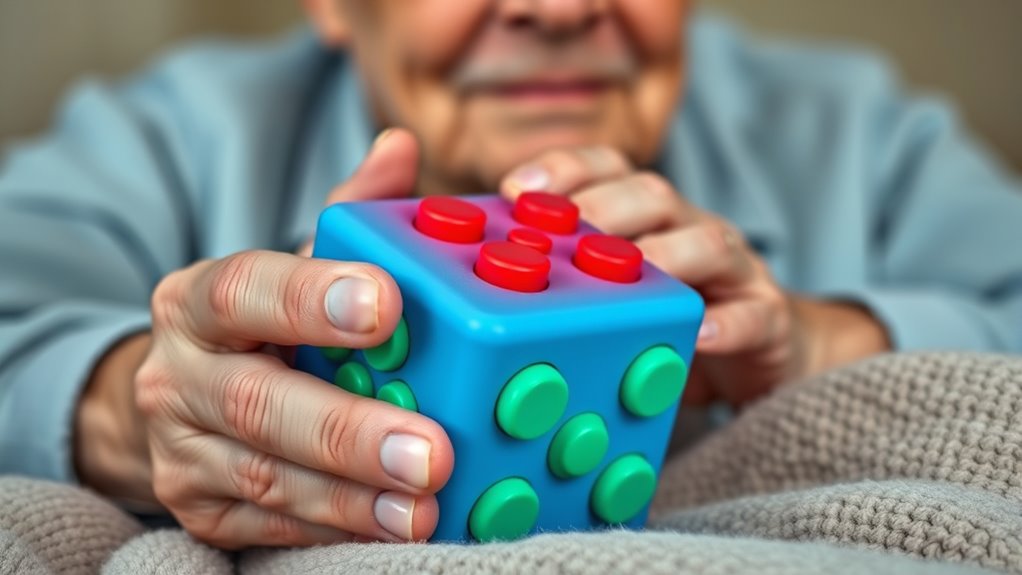
When selecting fidget toys for Alzheimer’s patients, I consider safety and the quality of materials to prevent any harm. I also look at how easy the toys are to use and whether they provide the right sensory engagement for the individual. Additionally, portability and storage are important factors to guarantee the toys fit into their daily routine comfortably.
Safety and Material Quality
Choosing a safe and high-quality fidget toy is essential, especially for Alzheimer’s patients who may have difficulty handling small parts or identifying hazards. I always look for toys made from non-toxic, hypoallergenic materials to prevent allergic reactions or poisoning risks. Durability is key—products should have strong construction and secure stitching to withstand pulling, twisting, and chewing. I also check that small beads or accessories are firmly attached to avoid choking hazards. Soft, skin-friendly fabrics and smooth surfaces help minimize irritation and discomfort during use. Most importantly, I prioritize age-appropriate designs that meet safety standards, ensuring there are no sharp edges or broken parts that could cause injuries. Safety and quality are non-negotiable when selecting fidget toys for Alzheimer’s patients.
Ease of Use
Since ease of use is vital for Alzheimer’s patients, I focus on selecting toys that are simple to operate with minimal instructions. Toys with intuitive designs allow patients to manipulate them easily without confusion or frustration. Lightweight and portable options help individuals with limited strength or dexterity use the toys effortlessly, promoting independence. Clear tactile feedback is essential, as it lets users immediately understand how to interact with the toy, reducing the need for supervision. Safety features, like secure accessories and non-toxic materials, guarantee that the toys are safe and easy to handle without risk of choking or injury. By prioritizing simplicity, I can choose fidget toys that encourage engagement and comfort without overwhelming or confusing the user.
Sensory Engagement Types
In selecting fidget toys for Alzheimer’s patients, considering the different types of sensory engagement is essential to meet their diverse needs. Tactile stimuli, like textured beads, ribbons, or rough surfaces, encourage touch and help ground patients in the present. Visual stimuli, such as bright colors or moving parts, can attract attention and stimulate sight, aiding focus. Auditory elements, like clicking, rattling, or squeaking sounds, provide soothing noise feedback that can reduce agitation. Incorporating multiple sensory engagement types into a single toy can amplify calming effects and support better sensory processing. By thoughtfully choosing fidget toys that engage multiple senses, I can help promote relaxation, improve focus, and create a comforting experience tailored to each patient’s unique needs.
Age and Condition Suitability
Selecting the right fidget toys requires careful attention to the individual’s age and stage of Alzheimer’s disease. I always make certain the toy is appropriate for their cognitive abilities to prevent frustration or safety issues. For example, I choose simple, easy-to-manipulate toys that match their current motor skills and dexterity levels. It’s also important to take into account whether the toy’s complexity aligns with their stage of Alzheimer’s, whether early or late, to maximize engagement. I avoid toys with small parts or choking hazards, especially for those with impaired swallowing or hand coordination. Additionally, I select sensory activities that match their preferences, whether tactile, visual, or auditory, to ensure the toy is both safe and stimulating, supporting their comfort and focus.
Portability and Storage
Choosing fidget toys that are portable and easy to store is essential for ensuring continuous engagement for Alzheimer’s patients. Lightweight, compact toys fit comfortably in pockets, bags, or on wrist cuffs, making them convenient for on-the-go use. Consider toys with foldable or multi-functional designs that save space and simplify storage, especially in limited areas. Using small containers or pouches helps keep toys organized and protected from damage when not in use, maintaining their condition. Durability and ease of cleaning are also important, ensuring toys withstand daily handling and remain hygienic over time. By selecting portable, well-organized options, caregivers can encourage regular use and seamlessly integrate calming activities into daily routines without hassle.
Durability and Maintenance
Durability and maintenance are vital factors when picking fidget toys for Alzheimer’s patients because these toys often undergo frequent handling and rough use. I recommend choosing toys made from high-quality, non-toxic materials like silicone, metal, or reinforced fabrics, which can withstand pulling and handling. Easy-to-clean and washable options help maintain hygiene and extend their lifespan with minimal effort. Toys with securely sewn or embedded accessories reduce the risk of parts breaking off or becoming choking hazards. Low-maintenance designs, such as silicone or rubber, don’t require special storage or delicate cleaning. Regularly inspecting the toys for signs of wear and tear is indispensable—replacing or repairing damaged items ensures ongoing safety and effectiveness. Proper choice and upkeep help maximize the benefits of these calming tools.
Frequently Asked Questions
How Do Fidget Toys Improve Cognitive Function in Alzheimer’s Patients?
Fidget toys help improve cognitive function in Alzheimer’s patients by engaging their senses and promoting focus. I’ve seen how manipulating these toys stimulates brain activity, which can enhance memory and attention span. They also provide a calming outlet for anxiety and restlessness, making it easier for patients to concentrate on tasks. Overall, fidget toys serve as a simple yet effective tool to support mental engagement and emotional well-being.
Are There Safety Concerns With Small or Textured Fidget Toys?
Absolutely, safety is a key concern with small or textured fidget toys. I always check for choking hazards, loose parts, or sharp edges before giving them to anyone, especially Alzheimer’s patients. It’s vital to choose toys made from non-toxic, durable materials that can withstand chewing or rough handling. Staying vigilant and selecting age-appropriate, well-made toys helps prevent accidents and guarantees a safe, calming experience.
How Can Caregivers Integrate Fidget Toys Into Daily Routines?
You can seamlessly incorporate fidget toys into daily routines by setting specific times for use, like during meals or quiet moments. I suggest introducing a favorite toy during activities to create a calming ritual, and encouraging gentle handling to foster familiarity. Keep toys accessible and verify they’re safe. This consistent integration helps patients feel secure and enhances their focus, making daily life more manageable for both of you.
Which Materials Are Safest for Sensory Toys for Dementia Patients?
I’ve seen how silicone fidget toys provide a safe, non-toxic option for dementia patients. Silicone is durable, soft, and free from harmful chemicals, making it ideal for those who might chew or mouth their toys. For example, a patient with oral tendencies benefited from a silicone ring, which was easy to sanitize and gentle on their skin. I recommend always choosing non-toxic, BPA-free, and food-grade materials for safety and peace of mind.
Can Fidget Toys Help Reduce Aggression or Agitation Episodes?
Yes, fidget toys can help reduce aggression and agitation episodes. I’ve seen firsthand how providing a calming distraction can redirect a patient’s focus and soothe their nerves. When they have something to hold or manipulate, it often minimizes feelings of frustration or restlessness. Fidget toys offer a simple, non-invasive way to help manage challenging behaviors, promoting a sense of calm and control for those with dementia.
Conclusion
Choosing the right fidget toys for Alzheimer’s patients is like finding the perfect key to open calmness and focus. These tools can turn moments of anxiety into opportunities for comfort and engagement. Remember, every individual is unique, so don’t be afraid to experiment. With patience and understanding, you’ll discover the toys that resonate most, helping to soothe their minds like a gentle breeze calming a restless sea.

